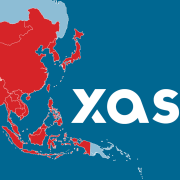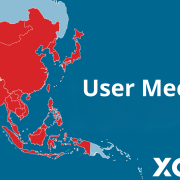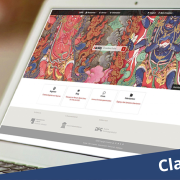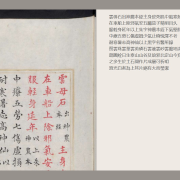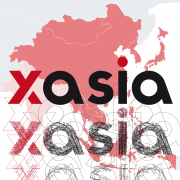Liebe CrossAsia-Nutzer:innen,
der Herbst ist bunt: Wir treffen uns beim CrossAsia User Meeting 2025, schulen uns in der VDB Online Fortbildung für Fachreferent:innen und Bibliothekar:innen der Asienwissenschaften, starten mit einem frischen Classroom-Programm ins Wintersemester 25/26 und diskutieren aktuelle Forschung in den CrossAsia Talks. Ganz gleich, ob Sie sich weiterbilden, lehren oder forschen – es gibt viele Gelegenheiten, CrossAsia neu zu entdecken und aktiv mitzugestalten!
CrossAsia Events im Herbst
Am 4. und 5. November 2025 findet eine VDB-Onlinefortbildung für Fachreferent:innen und Bibliothekar:innen statt, zu der wir Sie herzlich einladen. Wir informieren ausführlich über den FID Asien und CrossAsia, das Angebot und sämtliche Services. Alle relevanten Informationen zu Ablauf und Anmeldung finden Sie in unserem Blog.
Die Staatsbibliothek zu Berlin untersucht im Rahmen zweier Laborinitiativen innovative Ansätze zur Weiterentwicklung bibliothekarischer Dienstleistungen. Das CrossAsia Lab widmet sich der Erforschung des Potenzials künstlicher Intelligenz zur Verbesserung des Zugangs zu Wissen. Im Fokus steht die Entwicklung von Methoden zur Aufbereitung und Bereitstellung mehrsprachiger, lizenzierter und urheberrechtlich geschützter Materialien, um den Zugang zu umfangreichen Sammlungen in verschiedenen Sprachen und Schriften zu erleichtern.
Das Stabi Lab konzentriert sich auf den Wissenstransfer und die Förderung kollaborativer Forschungspraktiken. Ziel ist die Schaffung eines experimentellen Raums, der Innovationen ermöglicht und vielfältige Formen der Co-Creation sowie zukünftiger Partnerschaften unterstützt. Hier werden neue Ansätze zur Ideenentwicklung, Wissensvermittlung und Kooperation erprobt.
Gemeinsam demonstrieren diese Laborinitiativen in diesem Online-Workshop das Engagement der Staatsbibliothek zu Berlin für die aktive Gestaltung der Zukunft des Wissensmanagements und die Weiterentwicklung ihrer Rolle als zentrale Infrastruktur für Forschung und Bildung. Weitere Informationen finden Sie auch im Blog der Staatsbibliothek.
Die Veranstaltung findet in englischer Sprache statt. Referenten: Hou-Ieong Ho, Roman Kuhn, John Woitkowitz
Online-Workshop am Donnerstag, 6.11.2025, 14:00-15:30 Uhr
Link zum Meeting
Es ist wieder soweit! Wir laden Sie herzlich zu unserem CrossAsia User Meeting 2025 ein. Nach den positiven Erfahrungen der vergangenen Jahre (2021, 2023) freuen wir uns darauf auch in diesem Jahr wieder direkt mit Ihnen in den Austausch zu treten.
Wann und wo?
Datum: Dienstag, 11. November 2025
Zeit: 15:00-16:30 Uhr
Format: Online via Webex, ohne Voranmeldung
Ihre Stimme zählt!
Das User Meeting steht ganz im Zeichen des Dialogs zwischen unserem CrossAsia-Team und Ihnen als unsere Nutzenden. Wir möchten von Ihnen erfahren:
- Wie zufrieden sind Sie mit unseren aktuellen Services?
- Welche Wünsche und Anregungen haben Sie für die Weiterentwicklung?
- Wo sehen Sie Verbesserungsvorschläge?
- Welche neuen Features würden Ihre Arbeit erleichtern?
Interaktives Format mit Breakout Sessions
Um einen intensiven Austausch zu ermöglichen, planen wir Breakout Sessions zu verschiedenen Themenbereichen. So haben Sie die Möglichkeit, sich gezielt zu den Aspekten zu äußern, die für Ihre Arbeit besonders relevant sind. Wir planen sowohl Breakout Sessions zu den einzelnen Regionen als auch verschiedenen thematischen Schwerpunkten, beispielsweise unseren Services wie den Blauen Leihverkehr und DoD sowie Digital Humanities.
Nehmen Sie als Nutzendenvertretung am Fachbeiratstreffen 2026 teil!
Werden Sie Nutzendenvertretung im CrossAsia-Fachbeirat! Das nächste Fachbeiratstreffen findet im Januar 2026 vor Ort in Berlin statt. Hier haben Sie die Chance, die strategische Entwicklung von CrossAsia aktiv mitzugestalten und den Standpunkt der Community zu vertreten.
Möchten Sie die Community als Nutzendenvertretung repräsentieren? Dann senden Sie uns jetzt Ihren Kurzlebenslauf (max. 150 Wörter) – gerne mit Angabe Ihres regionalen Schwerpunkts. Aus allen Bewerbungen wählen wir zwei Personen aus, die die Nutzendenperspektive während des Fachbeirates vertreten werden. Der Fachinformationsdienst (FID) Asien übernimmt die Kosten für An- und Abreise sowie eine Übernachtung in Berlin. Näheres über den FID Asien sowie dessen Fachbeirat erfahren Sie hier.
Auch in 2026 wird unsere Talks-Reihe fortgesetzt. Aktuelle Informationen zu den anstehenden Talks finden Sie immer hier.
Und bis zum Jahresende erwarten Sie noch folgende Highlights:
- 20.11.2025: Prof. Joan Judge (York University) wird in einem Onlinevortrag mit dem Titel „New Conceptions: Modes of Knowing in Chinese Encyclopedias for Everyday Life“ neue Perspektiven auf die alltägliche Nutzung medizinischer Praktiken im vormodernen China präsentieren. Neben gedruckten Materialien werden auch Handschriften aus der Sammlung Unschuld berücksichtigt.
- 04.12.2025: Mackenzie Cooley (Hamilton College, USA), Huiyi Wu (Centre Alexandre Koyré, Frankreich), Shih-Pei Chen (Max-Planck-Institut für Wissenschaftsgeschichte, Berlin) werden in ihrem Onlinevortrag mit dem Titel „Knowing an Empire: Early Modern Chinese and Spanish Worlds in Dialogue“ einen Einblick in ihre interdisziplinäre Arbeit zum Spanischen und zum Chinesischen Reich geben.
Haben Sie Lust bekommen, selbst einen Talk zu halten? Alle Infos dazu finden Sie in unserem Call for Talks.
Wir starten mit einem frischen Classroom-Programm ins Wintersemester 25/26. Das vollständige Programm finden Sie wie immer in unserem Classroom. Wir führen gerne auch Schulungen auf Anfrage durch. Kontaktieren Sie uns unter: x-asia@sbb.spk-berlin.de
DH Lunch Talk Series startet im Februar 2026
Wir freuen uns, die nächste Runde der DH Lunch Talk Series für Februar 2026 anzukündigen! Nach der erfolgreichen Premiere in den Jahren 2023/2024 und der gemeinsamen Konferenz „Charting the European D-SEA: Digital Scholarship in East Asian Studies“ im Juli 2024 (mit 150 Teilnehmenden aus 19 Ländern) setzen wir unsere Bemühungen zur Förderung der digitalen Wissenschaft fort.
Ab Februar 2026 laden wir Sie monatlich zu Online-Vorträgen während der Mittagspause ein. Jede Sitzung umfasst einen 60-minütigen Vortrag inklusive Diskussion. Geplante Themen sind u. a. Manchu OCR, konfuzianische Akademien, KI-Methoden für historische Datenbanken und Ortsverzeichnisse.
Möchten Sie Ihre eigene Forschung im Bereich der Digital Humanities vorstellen oder ein Tutorial zu Ihren digitalen Tools anbieten? Wir laden Wissenschaftlerinnen und Wissenschaftler ein, die digitale Methoden in den Asienwissenschaften einsetzen, sich als Sprecher zu bewerben. Kontaktieren Sie uns bei Interesse unter x-asia@sbb.spk-berlin.de.
Das vollständige Programm wird im Januar 2026 auf CrossAsia veröffentlicht. Für regelmäßige Updates zu den digitalen Asienwissenschaften abonnieren Sie gerne unsere Mailingliste unter d-sea@listserv.dfn.de.
CrossAsia News
Neue Publikationen im CrossAsia Open Access Repository
Zwei neue sinologische Beiträge wurden freigeschaltet: Zum Einen die englische Übersetzung eines Beitrags aus der Zeitschrift „Asien“ von Jörg Rodenwaldt und Alexis Stanimiroudis „Tourism between Taiwan and China: Bridge or Obstacle to Cultural and Political Dialog?”. Zum Anderen die Monographie „China’s landless peasants and the role of state-led rural urbanization” von Isabel Heger-Laube. Im Bereich Japan sind nun alle Blogbeiträge des gleichnamigen abgeschlossenen DFG-Projekts „Urban-rural migration and rural revitalization in Japan“ bis einschließlich Mai 2025 veröffentlicht. Darüber hinaus ist Band 4 der Alliance for Research on East Asia (AREA) Ruhr Working Papers erschienen, der eine Round Table Diskussion zum Thema „Perspectives on the State and Future of Environmental History in Japan and Germany” enthält. Stephan Köhn hat einen japanischen Beitrag zum Onna setsuyō mojibukuro verfasst mit dem Titel 『女節用文字袋』における語彙集編纂の再検討. Und last, but not least lassen sich die Folien der Beiträge von Ursula Flache beim diesjährigen Japanologentag rund um „Publizieren im Open Access Repository sowie Schlaglichter auf Sonderbestände der Stabi Berlin“ und „Forschungsdaten“ nachlesen.
Das CrossAsia Team bedankt sich für die Einreichungen! Open Access soll wissenschaftliche Literatur für alle Menschen frei zugänglich und nachnutzbar machen, kostenlos und möglichst ohne technische und rechtliche Barrieren. Open Access ist somit ein zentraler Teil von Open Science und trägt zu einer transparenten, wissensbasierten Gesellschaft bei. Weiterführende Informationen zu Open Access bietet die Webseite des open-access.network.
Das CrossAsia Open Access Repository zeichnet sich aus durch:
- langfristige Archivierung
- DOI/URN-Vergabe
- Fachrepositorium für die Asienwissenschaften (DFG-White List für fachspezifische Repositorien).
- gute Auffindbarkeit via CrossAsia Suche und einschlägigen Recherche-Tools
- Erst- und Zweitveröffentlichungen sowie Forschungsdaten willkommen
- kostenfreien Service
Bei Fragen sprechen Sie uns gerne an unter x-asia@sbb.spk-berlin.de
Wir haben dem CrossAsia Newspaper Explorer zwei neue KI-gestützte Funktionen hinzugefügt: Eine davon ist eine Erweiterung der Ergebnismengen, die Sie durch einen oder mehrere Suchbegriffe aus einer oder mehreren Quellen erstellt haben, und zeigt „Ergebnisse nach Ähnlichkeit“ an. Die andere Funktion geht von einem der tatsächlichen Titel in Ihrer Ergebnismenge aus und löst eine „sprachübergreifende Suche nach ähnlichen Titeln“ aus.
Ausführliche Informationen zum technischen Hintergrund und eine Anleitung zur Verwendung dieser neuen Features finden Sie in unserem Blog.
Unsere Zusammenarbeit mit der Academia Sinica (Taiwan) hat kürzlich einen bedeutenden Meilenstein erreicht. Dank der großzügigen Unterstützung des Zentrums für digitale Kulturen der Academia Sinica können wir nun Volltextzugriff auf unsere digitale chinesische Sammlung bieten. Diese umfasst 1.937 Titel und über 121 Millionen chinesische Schriftzeichen.
Die Partnerschaft zwischen der Ostasienabteilung der Staatsbibliothek zu Berlin (SBB) und der Academia Sinica wurde am 16. Juli 2024 offiziell gegründet (siehe unseren Blogbeitrag von diesem Tag) und durch eine von beiden Institutionen unterzeichnete Absichtserklärung besiegelt. Die Vereinbarung umreißt unsere gemeinsamen Bemühungen, optische Zeichenerkennung (OCR) auf chinesische Bildtexte anzuwenden und die Ergebnisse – einschließlich gescannter Bilder und maschinell erstellter Transkriptionen – zu teilen, um die nicht-kommerzielle Forschung im Bereich der Digital Humanities, die Lehre und den öffentlichen Zugang in Deutschland und Taiwan zu unterstützen.
Die OCR-verarbeiteten Texte stammen aus der Sammlung „Early Chinese“ der SBB und umfassen sowohl gedruckte Werke als auch Manuskripte. Die frühesten Erwerbungen stammen überwiegend aus dem 17. Jahrhundert und wurden ursprünglich vom Großen Kurfürsten Friedrich Wilhelm von Brandenburg (1620–1688) für seine Privatbibliothek getätigt. Die Sammlung wuchs nur sporadisch, bis im 19. Jahrhundert die ersten systematischen Erwerbsreisen begannen – zunächst durch Karl Friedrich Neumann (1793–1870) und später, zu Beginn des 20. Jahrhunderts, durch Herbert Müller (1885–1966) und Friedrich Wilhelm Karl Müller (1863–1930).
Weitere Informationen dazu in Sie in unserem Blog.
Bis zum 30.11.2025 haben Sie die Gelegenheit, die Datenbank SSAP E-Book Plattform先晓书院 zu testen. Sie enthält nahezu sämtliche Medien, die der Verlag Social Sciences Academic Press seit den 1970er Jahren veröffentlicht hat: Dies sind nahezu 15.000 E-Books, 300.000 Artikel, 700.000 Bilder, über 1 Million Diagramme und Grafiken sowie mehr als 3.000 Stunden Audio- und Videomaterial. Die Inhalte werden täglich in Echtzeit automatisch aktualisiert. Rund 95% der Printausgaben liegen mittlerweile digital vor.
Enthalten sind Blaubücher, Sammelbände und großangelegte Materialsammlungen und Editionen. Die Inhalte decken das gesamte Spektrum der Geistes- und Sozialwissenschaften ab, darunter die Belt-and-Road-Initiative, Marxismus, chinesische Modernisierung, soziologische Studien, Länder- und Regionalforschung, Global Governance, die in Großbritannien aufbewahrten Dunhuang-Dokumente sowie Bibliographien. Darüber hinaus bietet die Plattform Materialien für regionale Studien, Branchenentwicklungsforschung sowie Forschung zu Schlüssel- und aktuellen Themen.
Prof. Sarah Panzer von der Missouri State University war im Frühling 2025 im Rahmen des Stipendienprogramms der Stiftung Preußischer Kulturbesitz an der Staatsbibliothek in der Ostasienabteilung zu Gast und hat sich intensiv mit der Bandō-Sammlung beschäftigt. In einem Gastbeitrag berichtet sie in unserem Blog über Ihre Forschung.
Artikel zur Philippinen-Sammlung der Staatsbibliothek erschienen
In diesem Jahr waren die Philippinen erstmals Ehrengast der Frankfurter Buchmesse. Aus diesem Anlass stellt unsere Südostasien-Referentin Dr. Claudia Götze-Sam die Philippinen-Sammlung der Staatsbibliothek in dem aktuellen Themenschwerpunkt der Zeitschrift BuB – Forum Bibliothek und Information vor. Die Ausgaben werden jeweils drei Monate nach ihrem Erscheinen auf BuB online gestellt.
Götze-Sam, Claudia: Vielfalt in Sprache, Kultur und Literatur: Ein Blick in die Philippinen-Sammlung der Berliner Staatsbibliothek als Teil des Fachinformationsdienstes Asien. In: BuB. Forum Bibliothek und Information 77(2025), 10, S. 480-483.
Meet CrossAsia
Kommen Sie mit uns ins Gespräch! Unser Team wird auf folgenden Konferenzen vertreten sein:
07.-09.11.2025: „(Un)Democratic Futures: Japan and Global Trajectories towards an (Un)Equal World“, Jahrestagung der Vereinigung für sozialwissenschaftliche Japanforschung (VSJF) an der Universität Wien.
21.-23.11.2025: XXXVI. Jahrestagung der Deutschen Vereinigung für Chinastudien „Selbstbilder – Fremdbilder“ am Asien-Afrika-Institut der Universität Hamburg
Vielen Dank für Ihr Interesse und Ihre Unterstützung. Wir freuen uns auf einen erkenntnisreichen und vielfältigen Herbst mit Ihnen!
Ihr CrossAsia Team


